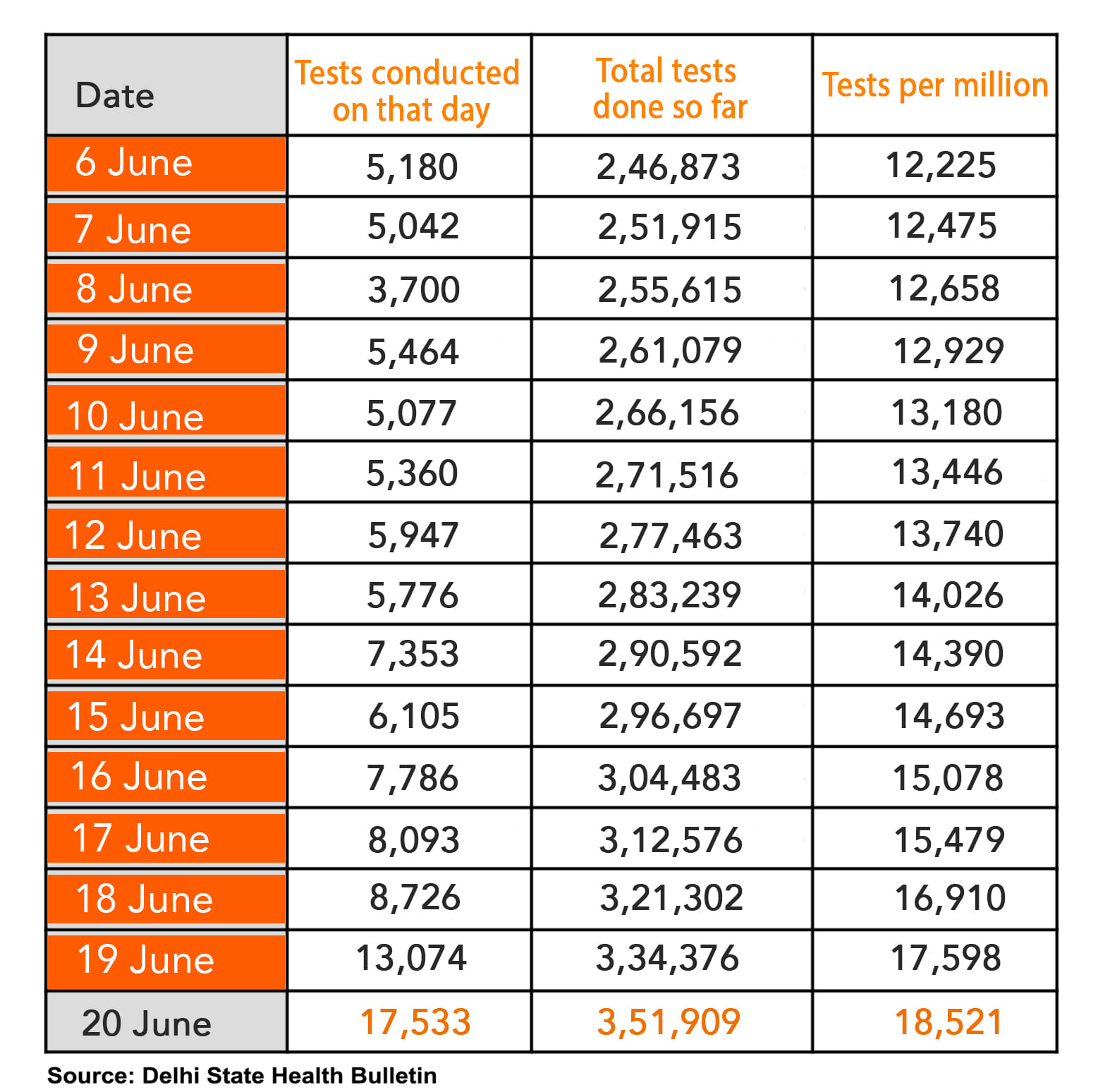New Delhi: A week after Union Home Minister Amit Shah met Delhi Chief Minister Arvind Kejriwal on 14 June, testing in the capital city has increased nearly three times.
Delhi tested 17,533 samples on 20 June, which is 2.8 times the number of tests conducted on 15 June (6,105 samples), according to official figures.
At the review meeting last week, Shah had said testing in the capital city will double in two days and increase by three times over the next six days.
While Delhi had averaged at 5,000 tests until 13 June, the figure stands at 10,000 from 15 June onwards.
The number of positive cases, meanwhile, has continued to surge. Delhi recorded over 3,000 new cases on the second consecutive day on 20 June, bringing the total to 56,746, the third highest in the country.
The city has also recorded 2,112 deaths so far, which is second worst after Mumbai that has recorded 5,984 deaths.
Also read: How ‘overconfident’ Delhi made a mess of Covid fight, forcing Modi govt to pick up the pieces
Rapid antigen tests
Delhi became the first state to begin rapid point-of-care antigen testing in containment zones and healthcare settings Thursday (18 June). There are 193 centres where antigen tests are being conducted.
The city had performed 19,720 rapid antigen tests and detected a total of 1,407 positive cases Thursday and Friday (18 and 19 June), according to information shared by Deputy Chief Minister Manish Sisodia in a tweet Friday.
आज दिल्ली मे 'रैपिड ऐंटिजेन टेस्टिंग' किट के ज़रिए 12680 लोगों का कोरोना टेस्ट हुआ जिसमें से 951 लोग पोज़िटिव पाए गए. https://t.co/YEcNquwEXD
— Manish Sisodia (@msisodia) June 19, 2020
This is almost a quarter of all the cases detected in Delhi in the two days.
Antigen tests, which can detect proteins or antigens specific to the coronavirus, can give results in about 15 minutes. It can be conducted outside the laboratory by a trained healthcare worker.
But due to its low sensitivity (the ability to detect true positives), all the samples which test negative will need to be confirmed again using RT-PCR tests, which takes about four to five hours for a result.
An official from SD Biosensor, the company manufacturing the antigen kits, had earlier told ThePrint that 50,000 kits have been supplied to the Delhi government and 50,000 more were expected to arrive by Friday (19 June).
An order of 6 lakh kits was also placed by the Indian Council of Medical Research (ICMR) and the Delhi government, added the official.
Increase in coronavirus testing
The rate of testing in Delhi now stands at 18,521 people per million of population, which is higher than the national average of 4,795, but lower than Mumbai’s (21,766 people per million of population).

Friday and Saturday (19 and 20 June) also saw 4,500 more RT-PCR tests being conducted than in the previous days.
Quoting government sources, news agency ANI had Thursday (18 June) mentioned that 20,000 samples were tested in a single day.
CM Kejriwal had also responded to it and said: “Delhi residents will not have any problem in getting tested for coronavirus. In the coming days more tests will be conducted.”
अब दिल्ली वसियों को टेस्ट कराने में कोई परेशानी नहीं होगी। आने वाले दिनों में इस से भी बहुत ज़्यादा टेस्टिंग की जाएगी। https://t.co/91fIRPhqXm
— Arvind Kejriwal (@ArvindKejriwal) June 19, 2020
But the Delhi bulletin listed only 8,726 tests that day, with no mention of the antigen tests.
ThePrint tried reaching out to Delhi Health Secretary Padmini Singhla and Aam Aadmi Spokesperson Saurabh Bharadwaj to know whether rapid antigen tests are added to the total testing figures in the bulletin but failed to get a response.
“The number of tests for those who test positive are included in the total number of tests conducted. But I am not sure if the number of tests for those who test negative are included in the tally,” said an ICMR official.
ICMR mentions a cumulative number of tests conducted, without giving a break-up of those done via RT-PCR, the cartridge based CBNAAT or TrueNAAT.
India conducted 1.9 lakh tests on 20 June, bringing the total number of samples tested to 68 lakh. As of 21 June, the total number of cases in the country stood at 4.10 lakh, the fourth highest in the world. There have been 1.69 lakh active cases and 13,254 deaths so far.
Also read: Delhi govt issues order fixing cost of Covid-19 isolation, ICU beds at private hospitals







The understanding of the author about the purpose of antibody test v/s PCR test is abysmal. The antibody test is not diagnostic – it is to detect the extent of the disease in the population. Testing +ve absolutely does not mean one is contagious – it just means that one may have come in contact with COVID in the past and may be thus even be immune to the disease. The diagnosis has to be done by testing for viral RNA using PCR. It is irresponsible to write about such sensitive topics without knowing anything about the details. I sincerely hope that poor souls who test +ve for antibodies are not put into unnecessary quarantine.